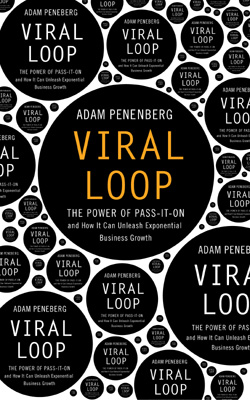Viral Loop: The Power of Pass it On

Viral Loop: The Power of Pass-it-On
A ground-breaking, agenda-setting book that reveals the business model that has propelled the likes of YouTube, Google, Facebook and MySpace to global success.
Here's how it works: you read a book you enjoy and you tell a friend. That friend tells another friend, the next friend tells the next, and so on and so forth, until the book becomes that year's word-of-mouth bestseller. That first recommendation gives birth to many. Simple. The concept of pass-it-on is not so new and not so revolutionary, that is until forward-thinking Web companies got hold of it and created their own, mightily efficient, money-spinning model known as the Viral Loop: the ability to grow a company exponentially because the customers themselves spread it. Super simple.
Outfits such as Google, eBay, Flickr and Facebook all employ the model at the core of their business; all have seen their stock valuations skyrocket within years of forming. The genius lies in the model's reliance on replication: what's the point of using Facebook if none of your friends can see your profile, or using Flickr if you can't share your photos? Where's the joy in posting a video on YouTube if no one watches it? Thus, in creating a viral product that people want, need and desire, growth can, and will, take care of itself. Business has never been so straightforward, or so it would seem...
In this ground-breaking work, we are introduced to the architects of the Viral Loop and the companies which profit from its mechanics. Insightful, timely and revelatory, it will reveal the secrets behind the most successful businesses in recent history, and will explain how the Loop will catch you up, sooner rather than later.
Adam Penenburg has written for Forbes, The New York Times, Fast Company, Slate, Wired, The Economist, and Mother Jones. A former senior editor at Forbes, Penenberg garnered national attention in 1998 for unmasking serial fabricator Stephen Glass of The New Republic. Penenberg`s story was a watershed for online investigative journalism and is portrayed in the film `Shattered Glass`. A journalism professor at New York University, Penenberg is the assistant director of the Business & Economic Program. He lives in New York.
Viral Loop: The Power of Pass-it-On
Hachette Australia
Author: Adam Penenburg
ISBN: 9780340994962
Price: $35.00
Interview with Adam Penenburg
What originally motivated you to write this book?
Adam Penenburg: Well I was writing a story for a magazine called Fast Company and I interviewing Marc Andreessen, he created the Mosaic browser and was the co-founder of Netscape. I met Marc and he told me about his new company name and that the company was an example of a viral loop, I was surprised because I had never heard of it. So, I spent time researching it and found out that it was a powerful business growth paradigm, which is why I started writing about it.
Give us a quick run down of how the book explores The Power of the Pass it On?
Adam Penenburg: I look at different case studies; I look at companies from Hotmail to Facebook, Twitter, Skype, MySpace, all these companies that are viral companies, they grew in users because of users.
What research went into this book?
Adam Penenburg: A fair amount of research, I spoke with about 60 or 70 people.
Who is this book for?
Adam Penenburg: I think anyone who runs a business would really be well taken care of to read about these companies that grew.
How can a business easily use The Power of the Pass it On?
Adam Penenburg: Well, this is when your users become your marketers for you in a sense, they like your product so much they are willing to spread it. If you can get into that dynamic where your users are actually spreading your product then you're in a good position.
How has social networking sites changed the way businesses are marketed?
Adam Penenburg: Well, they sure have, because we spend so much time on social networking sites, so that is where your audiences are, businesses are trying to reach people on social networking. When people are on social networking sites they are socialising they are not ideal to be marketed too.
Where do you see social networking sites taking us in the future?
MORE



